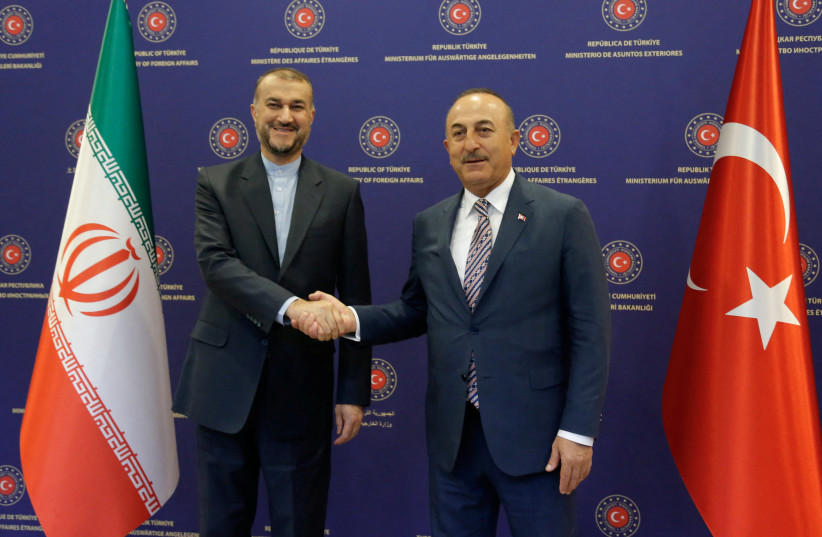Iran hosted Qatar’s foreign minister Mohammed bin Abdulrahman Al Thani this week. He met with his Tehran counterpart Hossein Amir-Abdollahian as well as with Ali Shamkhani, a key Iranian official. This is important because Doha is trying to push a renewed Iran deal as part of a way for Qatar to become a broker between Iran and the US so that Qatar can use this leverage to enhance its role in the region.
This is not a small development. Qatar and Turkey are close allies. Turkey’s President Recep Tayyip Erdogan will be visiting Iran on July 19, the Turkish Presidency said Tuesday. The visit will take place after US president Joe Biden is scheduled to come to Israel and Saudi Arabia. This means Ankara will be working with Tehran, as Washington is working with Jerusalem and the Saudis. This is both symbolic and important.
Connect the dots here. Amir-Abdollahian recently visited Turkey, which condemned US sanctions on Iran. "We have been against one-sided sanctions on Iran and do not approve those sanctions," Turkey’s foreign minister Mevlut Çavusoglu said at a joint press conference with him.
This means the Turkey-Iran partnership is growing. It’s important to note that these two countries are key partners. They are also partners with Russia. Yet Turkey is supposed to be a member of NATO. It often threatens the defensive alliance, for instance trying to sabotage Finland and Sweden from joining. Turkey threatens NATO, and its members like Greece, while working with Iran.
Ankara never threatens Iran, Russia, or other countries. Its policies are solely designed to undermine democracies that have human rights such as Sweden and Finland, and use NATO as a tool for its desire for a new invasion of parts of Syria. Turkey wants to attack Kurdish areas there after ethnically cleansing Kurds from Afrin and other areas in 2018 and 2019.

How does this affect the area?
THIS IS potentially disastrous for the Middle East and Europe. Turkey’s leader was recently in Madrid wringing concessions from NATO and bashing its allies in order to show off Turkey’s “coercive diplomacy.” Pro-Ankara commentators celebrated Turkey getting NATO members to appease its demands. Even the US president took time to meet Turkey’s authoritarian leader. Joe Biden frowned through the meeting, but Ankara got to tweet about its success.
Meanwhile, Ankara’s real friends and allies in Moscow and Tehran were waiting for feedback. Turkey is sabotaging NATO; this helps Russia and it could help Iran. Iran sees Qatar and Turkey as their main agents in the West. Qatar works to become a broker: for Hamas deals, for the Taliban and now for the Ayatollah.
The goal of Qatar is to be indispensable. It hosts a US military base. It hosts extremists and then tells the West that the best way to work with them and keep them from becoming more extreme, is to call Qatar. Turkey has learned from the Qatari dojo in this respect.
Ankara also seeks to play both sides. It works with Russia and buys S-400s. But it also works with NATO. It tells the alliance that if it doesn’t cater to Turkey's wishes then Ankara could go rogue and become a threat, using migrants or its large military to destabilize things. It tells NATO in essence: You need Turkey more than Turkey needs you.
As such, both Turkey and Qatar set themselves up as countries that are necessary because of the potential threat they can also impose. Countries that seek to be solely partners and allies of the West don’t have the threat card to play and they don’t have the extremists to “control” through brokerage.
The Iran angle is now important here. Qatar’s role with the Taliban or Hamas is only a small part of the iceberg of the Iranian-Qatari discussions that now appear to have something to do with a potential new Iran deal.
If Qatar can swoop in after Europeans failed for a year to get a deal, then it will be sin-qua-non of diplomatic dealings. If Turkey can go to Iran, during the same time that Biden is visiting Israel and Saudi Arabia, this will showcase how Ankara and Iran are working to divide the region.
The overall context here is that while the Turkey-Iran-Qatar relationship is important, the Turkey-Qatar axis is a key to the region because both countries back the Muslim Brotherhood, including groups like Hamas, which Iran also backs. Meanwhile, all these countries also do deals with Russia.
Understanding how these countries are working closely together is important because of many reasons, such as the recent NATO meeting in Madrid, Ankara’s threats against letting democracies join NATO, Russia’s war in Ukraine and the Iran deal.
